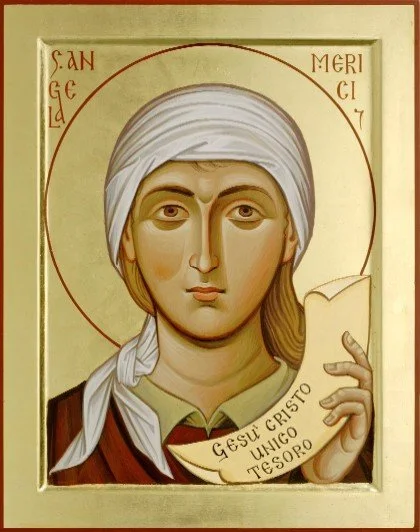Saint Angela Merici: Doing Something New
My paternal grandparents grew up in southeast Missouri in the years before Great Depression (my grandfather in St. Francois County in 1915 and my grandmother in Iron County in 1920). Although I don't know anything about my grandfather's early education, my grandmother was always proud that she and her siblings had been educated by the Ursuline Sisters of the Roman Union at the Ursuline Academy in their hometown of Arcadia.
The former Ursuline Academy (including St. Joseph Chapel) in Arcadia, Missouri
When I was a child, I had a chance to visit the old academy with my grandparents and my great-aunt Helen. I remember meeting a few of the sisters who were still in residence, working in the preschool—all that remained of the once thriving boarding and day schools. Along with the old spring house and the Lourdes grotto, I got to see the remarkable St. Joseph's Chapel in which my grandparents were married in 1946.
In my years as a religious, I have also come to the Ursuline Sisters, primarily through time spent in retreat at the motherhouse of the Ursuline Sisters of Mt. Saint Joseph and in working with some of the Ursuline Sisters of Louisville. I have certainly grown to appreciate the Ursulines’ ministries and the prophetic stance they've taken in many areas, especially with regard to women's issues and the rights of children. I also recognize that I, personally, owe a debt of gratitude to those sisters serving in Arcadia who, generations ago, formed my grandmother in the Catholic Faith.
Saint Angela Merici, the founder of the Ursulines, was born in 1470 in the Lombardy region of Italy. A member of the Third Order of Saint Francis, she brought together a group of women who established a sort of "support group" for unmarried girls in their neighborhood. Her deep spirituality and charitable works became widely known and she had the support of many of Brescia's influential citizens.
Angela recognized that non-aristocratic women, especially those who were unmarried, had practically no options for their lives. Their lack of education and inability to support themselves forced such women to become servants, prostitutes, or beggars. The most recent edition of Butler's Lives of the Saints praises her work, significantly noting that "she was not providing a refuge for women who had failed to find husbands, but asserting the original dignity of all women in a primary relationship to Christ." The young women she brought together formed what would eventually become a new religious community under the patronage of Saint Ursula, a virgin and martyr who was honored as the leader of a group young women who died for their faith in the fourth or fifth century. The "Company of Saint Ursula" became one of the first communities of teaching sisters in the Church and their way of life broke with many of the conventions of religious life at that time, including the fact that the members had no formal enclosure or convents (early Ursulines lived with their families or with other members) and they had no religious habit.
“Be sincerely kind to every one according to the words of our Lord: Learn of me, for I am meek and humble of heart. Thus you are imitating God, of whom it is said: He has disposed all things pleasantly. And again Jesus said: My yoke is easy and my burden is light.”
-Saint Angela Merici
Less than five years after establishing the "Company," Angela Merici died in Brescia on January 27, 1540. She was canonized in 1807 and has come to be honored as one of the patrons of those with physical disabilities. The Church celebrates the memory of Saint Angela Merici on January 27.
Reflecting on the life of Saint Angela Merici, I am reminded of Pope Francis’ words in Evangelii Gaudium ("The Joy of the Gospel"):
Jesus [can break] through the dull categories with which we would enclose him and he constantly amazes us by his divine creativity. Whenever we make the effort to return to the source and to recover the original freshness of the Gospel, new avenues arise, new paths of creativity open up, with different forms of expression, more eloquent signs and words with new meanings for today's world. Every form of authentic evangelization is always "new” (no. 11).
This passage seems especially significant as we remember a spiritual leader who stands out as one of those graced souls in the Church's history who dared to do something new. Although Angela had her critics (including some of those same supportive noble families who later became suspicious of her and feared she'd "steal away" their marriageable daughters), she saw that, in order to fulfill her vocation, she had to set out on new paths. For this reason, she is an especially important witness for us today, particularly as changes within society and the Church demand new and innovative forms of ministry.
As we remember Saint Angela Merici, take a moment to pray that her spiritual daughters—and each of us—will be open to God's call and to seek out new ways of serving those who most need love:
“Act, move, believe, strive, hope, cry out to Him with all your heart, For without doubt you will see marvelous things, if you direct everything to the praise and glory of his Majesty and the good of souls.”—Saint Angela Merici
A prayer in honor of Saint Angela Merici +
Gracious God, following the example of Angela Merici, we ask that you enlighten, direct, and teach us what we must do for love of you and for your people. Bless us as we walk ahead for whatever you call us this day and everyday. Amen.
-from the Ursuline Sisters of Cleveland

